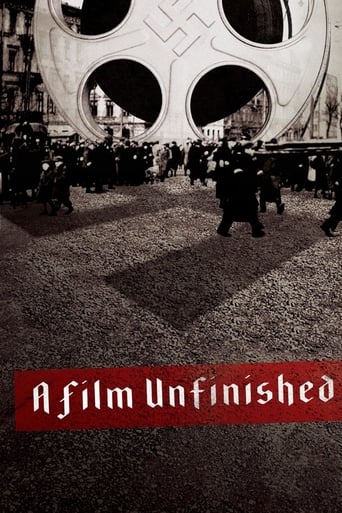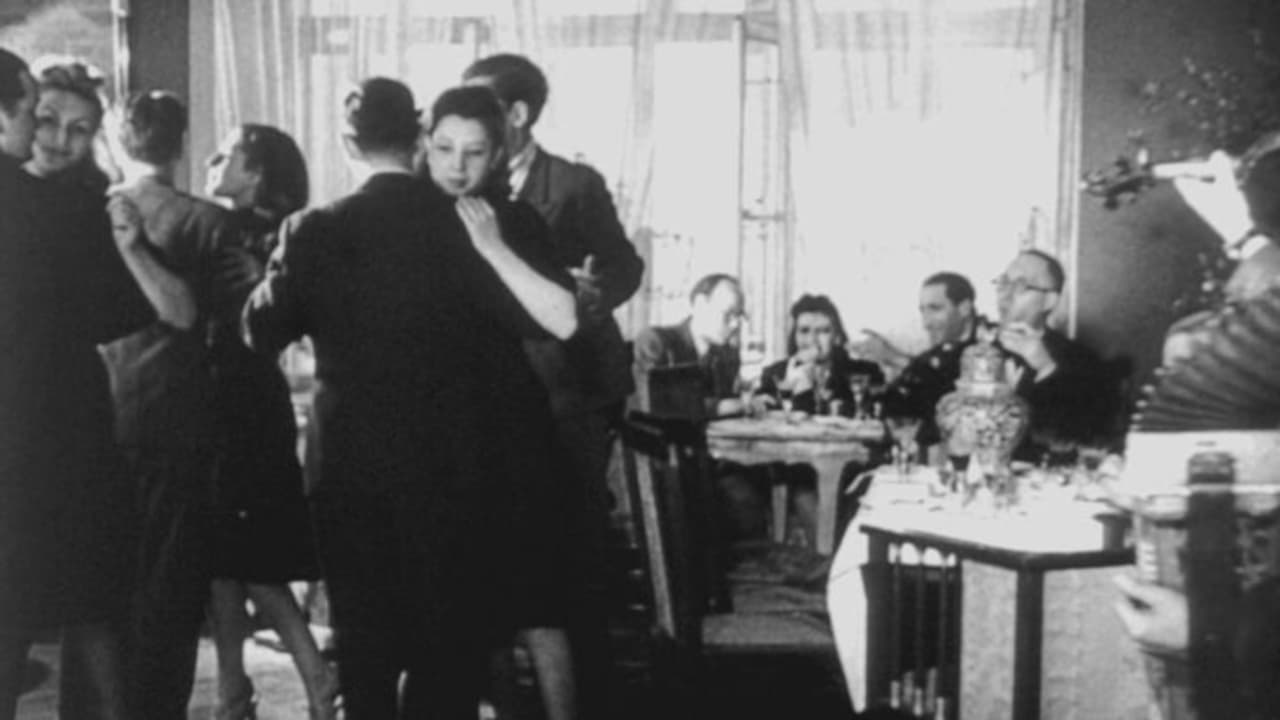nadejdakuznetzova
"A Film Unfinished" - film by Yael Hersonski.
Why "A Film Unfinished" & why credit it to Yael Hersonski? It was perhaps perfectly finished already! Old Chinese proverb: A picture tells a thousand words! This is basically a silent movie - i.e. without words, but it needs no words! With scathing, hateful looks & gestures, privileged persons glare at starving, sick/dying, traumatised children & young & old women & men who have somehow become entangled against their will, within a horrendous environment - interloping into the "precious" lives of the privileged.
Whoever made this documentary obviously wished to expose Capitalism - with the obscenity & depravity of wealth, glowing physical beauty & health vs Poverty - with the depraved & deprived extreme social exclusion & powerlessness of lower status.
Extreme sadness! But this projection cannot be faked! Not even in Hollywood!
While film maker, Yael Hersonski suggests this documentary was for Nazi Propaganda Machine in 1942, I suggest this documentary was made by persons who wished to expose truths - not falsity of propaganda! Who would agree to expose themselves as "capitalist pigs" for the Nazi war machine? Were they also Nazis or Jewish collaborators? Or simply stupid people who really did think they were superior to poor masses? This is the basic understanding of capitalism & accordingly, is no crime. The opposite view is to understand Jesus, Mohammed, Marx & Engels, Lenin, Stalin, Trotsky, Castro, Chavez, etc., etc., etc.
I think "A Film Unfinished" was perhaps originally assembled perfectly to defy capitalism in all its degrees .... to expose its depraved power & how it suffocates the poor! But in reality, capitalists ultimately are big-time losers! While the poor physically die in extreme pain & sadness, the rich die - sooner or later - also ... but in extreme mental & soul-strangling torment.
Nazis were expert in capitalist tacts! Initially practising euthanasia, they quickly moved to obvious murder - striking against anyone & everyone - rich or poor - like insane creatures! And this is the message of this film! These insanity has no particular ethnicity & is non-discriminatory! While the film's female commentators recall their personal hygiene during the Holocaust, they nevertheless couldn't spare a mouldy crust of bred for an orphaned beggar child who scrounged through filthy faecal/excrement heaps in the streets for sustenance! So who is the Nazi?
So humanity behaves humanely towards the vulnerable/powerless! If this is capitalism, I choose communism/socialism - whichever is appropriate to the situation! - extreme or mundane. Actually in this film, one sees German soldiers standing idly by watching the privileged Jews deliberately averting their gaze from the "ugliness of the poor". Do the German soldiers, watching from the sidelines, recognise themselves in the ugly capitalist creatures who in their disdain of the poor, hasten their inevitable fate.
Close ups of the film show individual victims of holocaust (viewings of every angle of their shaven heads) - defenceless in their diminishing dignity & pride but nevertheless with underlying defiance. They appear stoically beautiful! In stark contrast, the rich privileged capitalists are perversely ugly despite their obvious wealth! I'm not a believer in conventional god but i understand Escher's "Scapegoat" analogy of God & Satan. Furthermore there were more than Nazi hands that "rocked the cradle"! These are the hypocrites!
Steve Pulaski
The fact that the Nazi/Third Reich regime, in conjunction with its rise to power in the 1930's Germany, instilled a massive propaganda machine to inflate the popularity and perpetuate the alleged good of its policies is nothing new, but the far-reaching abilities of such a machine are still being studied today. We're told in the opening minutes of Yael Hersonski's documentary A Film Unfinished that a concrete vault was discovered to have housed over 1,000 reels of propaganda footage. This particular documentary chooses to focus on one mysterious and overlooked piece known only by the name on the tape of its reel: "The Ghetto." The piece is an hour-long showcase of life in Warsaw, the largest Jewish ghetto in occupied Poland at the time. It was a cramped, walled-in location that spanned less than three square miles of territory with serious food stability and housed many deported Jews from the Reich. It has no audio, the celluloid is heavily damaged and corroded, as most poorly stored celluloid from the time is, and the scenes in the film are heavily staged bits that showcase Jews enjoying life in the ghetto.Largely hidden in the film and only seeping through some seriously heart-wrenching moments are the realities of the Warsaw Ghetto: unforgivably dirty conditions, overcrowded streets and homes that would make a viewing of this documentary in an atrium feel claustrophobic, and the frail subjects, some barely supporting the clothes on their backs through what is basically thin flesh and weak bones. While "The Ghetto" isn't shown in its entirety in A Film Unfinished, Hersonski and company look to add context to the time period by way of narration from an appointed Warsaw judge during the time period, as well as people who actually lived and experienced the conditions in Warsaw.But perhaps the most interesting interviews and testimonies in the entire film come from a man named Willy Wist, one of "The Ghetto"'s camera operators. We're told that a German crew would frequently come into Warsaw and actively monopolize and stage certain areas in order to "portray" life in the ghetto the way they wanted to; it was unnatural and incredibly forced, as most propaganda of the time was. Wist gives his opinions decades later on being one of the cameraman for such a project, in the midst of profiling the horrors that went when the cameras were off before they were turned on to capture the events inside an isolated community of outcasts."The Ghetto" is greatly reminiscent of a 1945 short film by the name of Topaz, which was smuggled out of the Topaz War Relocation Center in Utah during World War II. That film profiled the families and daily activities of Japanese people inside an internment camp, and, according to the film's director, was largely predicated upon false responses and facial expressions from those inside the camp who were said to be miserable and beaten by the poor conditions. The existence of a film like "The Ghetto" exposes three levels of sickness in the treatment of Jews during World War II: the first is the active isolation, condemnation, and genocide of an entire group of people, the second is the act of exploiting the unfathomable suffering of the very same group of people by way of fabricated documentation, and the third is the appalling manipulation of such footage, which spins undernourishment, disease, and horribly inhumane living conditions, into positive attributes of a lawless and unjustifiable prison.Townspeople throwing garbage outside of their windows is a normal occurrence in Warsaw, in addition to apathy due to pervasive hunger and lack of food of any kind. The coffin-sealing nail of complete and utter disgust for me, personally, was to see a mountain - about as large as one of those impenetrable and ever-present snow-mounds in the center of a strip mall parking lot - of feces and human waste. Such horrors of Warsaw are shown in grave detail, and as disgusting as it was to experience, much less witness, it serves a fitting analogy for the conditions and overall quality of life in Warsaw. A Film Unfinished, as a documentary, would've probably done better to spend about thirty minutes giving us background into the discovery of the film, in addition to interviews with Wist and those who suffered in Warsaw, before actually showing the entirety of "The Ghetto." There are films like Dark Blood and Steve Jobs: The Lost Interview, previously lost or unfinished works that recognize that fact by way of narration and exposition before actually giving us the promised product. The fact that Hersonski and company elaborate so much on "The Ghetto" in the first twenty minutes, but only proceed to show us maybe thirty to forty minutes of the project coupled with either narration or interjected interviews to distract from the events of the film, is pretty disappointing.A Film Unfinished does a nice job at attempting to be an all-encompassing piece devoted to profiling and really detailing the motivations behind this curious oddity of a contemptible time period in world history. I find it incredibly interesting that, even eight decades later, more information about World War II than ever, such as the art and sculptures the Nazis robbed from Jewish museums, the propaganda machine, and the living conditions in both internment camps and Germany itself, is trickling out to the public. A Film Unfinished is a necessary, if bleak, look into how sick - but pervasive and vital - Third Reich cinema was during the time, much less the actions of the Nazis themselves.Directed by: Yael Hersonski.
mirekcanada
This film is testament to the survivors of the "Final Solution" but its also a sad reminder of my past, as a relative of a survivor its just almost as bad as living it yourself I heard the stories from my Dad and Grandmother, and they sounded like unbelievable stories, But to see the footage I was able to put a real face on the stories my Relatives told me, I could picture my Dad as one of the children in the documentary ( hes was yrs old in 1942) My grandfather was a prisoner of Auswich, my grandmother worked at one of the factories associated with the concentration camp, she refused to leave Poland as the transfered the workers to Germany when the Russians where at the footsteps, subsequently when the Russians arrived at the new Factory in Germany the shot all the Poles who worked their as collaborators so thanks to My grandma I'm here today. Seeing this documentary reminds me of the life they had, what they endured, and the reason I,m here today . I thank the people who put this together and most of all I thank my Grandmother, Grandfather (he escaped and was part of the Polish Army at Monty Casino) and my father who had no childhood. I love you all and God bless.So see it to mourn for the dead and to celebrate the privileged live you live, and thank the WWII veterans who gave their lives, and the many who returned scared for life to rid us of the Nazis
Michael Wehle
In publicity for this movie much is made of a truth to be revealed by footage in a newly discovered spool of film, however revelations to be had from the find seem profoundly limited to a single point: in a Nazi film of life in the Warsaw ghetto the scenes are staged.Footage of walking cadavers is certainly powerful, and emotional recollections of survivors is moving, but, heartless though it may sound, there is nothing new presented here. The only thesis articulated is really pretty uninteresting, and possible ancillary themes are never developed: Rüdiger Vogler reads the testimony of cameraman Willy Wist, who says what he witnessed in the ghetto haunted him long afterward, even despite some of the things he saw later. The narrators might have asked what Wist was referring to. What is the context into which Wist fits his memories of the ghetto? We're shown the Nazis repeatedly staged shots to stress contrasts between wealthy, well-fed Jews in the ghetto and the majority who were starving, but there is no exploration of the reality – a narrator simply recollects that a few dozen people were able to remain well fed.Rather than a coherent whole this is an hour and a half of staged footage of the May 1942 Warsaw ghetto interspersed with survivor commentary. The holocaust canon has more rewarding works.


 AD
AD


